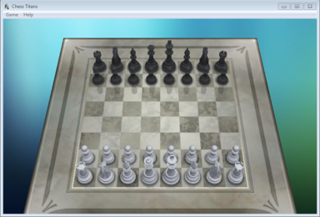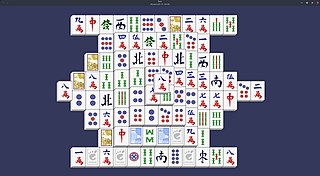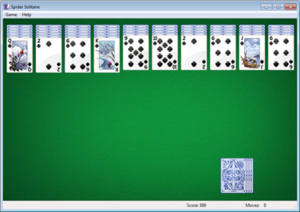
Klondike is a card game for one player and the best known and most popular version of the patience or solitaire family, as well as one of the most challenging in widespread play. It has spawned numerous variants including Batsford, Easthaven, King Albert, Thumb and Pouch, Somerset or Usk and Whitehead, as well as the American variants of the games, Agnes and Westcliff. The distinguishing feature of all variants is a triangular layout of the tableau, building in ascending sequence and packing in descending order.

FreeCell is a solitaire card game played using the standard 52-card deck. It is fundamentally different from most solitaire games in that very few deals are unsolvable, and all cards are dealt face-up from the beginning of the game. Microsoft has included a FreeCell computer game with every release of the Windows operating system since 1995, which has greatly contributed to the game's popularity.

Spider is a type of patience game, and is one of the more popular two-deck solitaire games. The game originated in 1949, and its name comes from a spider's eight legs, referencing the eight foundation piles that must be filled in order to win.

Simple Simon is a patience or solitaire card game played with a regular 52 cards deck. It is a close relative of the well-known Spider Solitaire. It became somewhat popular being featured in some computerized collections of Solitaire card games, but its origins possibly predate its implementation as a computerized game.

Scorpion is a patience or solitaire card game using a deck of 52 playing cards. Although somewhat related to Spider, the method of game play is akin to Yukon. The object of this game is to form four columns of suit sequence cards from king down to ace.
The Start menu is a graphical user interface element that has been part of Microsoft Windows since Windows 95, providing a means of opening programs and performing other functions in the Windows shell. The Start menu, and the Taskbar on which it appears, were created and named in 1993 by Daniel Oran, a program manager at Microsoft who had previously collaborated on great ape language research with the behavioral psychologist B.F. Skinner at Harvard.

Full Tilt! Pinball, known as Pinball 95 in Europe, is a 1995 pinball video game developed by Cinematronics and published by Maxis. It features pre-rendered 3D graphics and three tables: Space Cadet, Skulduggery, and Dragon's Keep. A sequel called Full Tilt! Pinball 2 was released in 1996.
Mrs. Mop is a patience or solitaire card game which is played using two decks of playing cards. Invented by Charles Jewell, it is a relative of the solitaire game Spider in which all of the cards are dealt face up at the beginning of the game. The rules are simple, but working out the right thing to do is a slow process, in which "patience" may be an important word. If you can make a couple of spare columns, your chance of winning is pretty good.

Miss Milligan is a patience game which is played using two decks of playing cards, and is one of the most popular of the double-deck games. According to Peter Arnold, author of Card Games for One, this classic game's enduring popularity is in part due to its amazing tendency to enable complete recovery from seemingly hopeless positions. Winning chances with good play are about 1 in 20 games.
Microsoft Plus! is a discontinued commercial operating system enhancement product by Microsoft. The last edition is the Plus! SuperPack, which includes an assortment of screensavers, themes, and games, as well as multimedia applications. The Microsoft Plus! product was first announced on January 31, 1994, under the internal codename "Frosting". The first edition was an enhancement for Windows 95, Windows 95 Plus!

Hearts, also known as Microsoft Hearts, and The Microsoft Hearts Network prior to Windows XP, is a computer game included with Microsoft Windows, based on a card game with the same name. It was first introduced in Windows 3.1 in 1992, and was included in every version of Windows up to Windows 7. Despite the name, the game rules correspond to those of Black Lady in which the queen of spades is a penalty card, in addition to the cards of the heart suit that are the only penalty cards in the traditional card game of Hearts. An online version, named Internet Hearts was included in Me and XP.

Purble Place is a suite of three educational computer games developed by Oberon Media that was included with all versions of Windows Vista and Windows 7.
There were various games and applications available in Windows Live Messenger that could be accessed via the conversation window by clicking the games icon and challenging a "buddy".

Chess Titans is a chess video game with 3D graphics developed by Oberon Games and included in Windows Vista and Windows 7 Home Premium, Professional, Enterprise, and Ultimate. It is a fully 3D animated, photorealistic interactive chess game with ten difficulty levels when played against the computer. It can be played by two participants, or one player against the computer.

Microsoft Mahjong is a computer game version of mahjong solitaire published by Microsoft. The version titled Mahjong Titans was developed by Oberon Games and included in Windows Vista and Windows 7. It takes advantage of the new graphical user interface (GUI) of Windows Vista, and includes features such as tile set and background choices. The game did not make it to Windows 8; however, a standalone version, developed by Arkadium and published by Microsoft Studios, can be downloaded from the Windows Store free of charge and played without download on the web.

Solitaire is a computer game included with Microsoft Windows, based on a card game of the same name, also known as Klondike. Its original version was programmed by Wes Cherry, and the cards were designed by Susan Kare.

FreeCell, also known as Microsoft FreeCell, is a computer game included in Microsoft Windows, based on a card game with the same name. It is one of the most widely used Windows programs, estimated to be ahead of Word and Microsoft Excel. It has been included with every release of the Windows operating system since 1995, which has greatly contributed to the original game's popularity.

Mahjong solitaire is a single-player matching game that uses a set of mahjong tiles rather than cards. It is more commonly played on a computer than as a physical tabletop game. It can be played using genuine tiles and a special wooden frame for set-up, although this has the tedium of set-up and the temptation to cheat.

Microsoft Solitaire Collection is a video game developed by Microsoft Casual Games and published by Xbox Game Studios for Microsoft Windows. It combines the Solitaire, FreeCell and Spider Solitaire titles that were included with previous versions of Windows. It also introduces Pyramid and TriPeaks to Windows for the first time, as well as new daily challenges and themes. Unlike the games included in Windows 7 and earlier versions, Microsoft Solitaire Collection is freemium adware with Xbox Live integration.
















